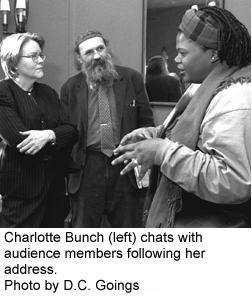The University Record, March 25, 1997
National discussion of women’s, human rights needed
 By Deborah Gilbert
By Deborah Gilbert
News and Information Services
Women throughout history have been leaders and creators of the “civil society.” They have solved local problems and have held the community’s cultural fabric together through difficult, sometimes brutal, times.
“Women’s leadership is not new at the local level, but now we must move it to the national and international level,” urged Charlotte Bunch, who gave the Center for the Education of Women’s sixth annual Elizabeth Mullin-Welch Lecture on March 11. “Women, the peace-makers, bring a different perspective to the table and must sit with the men, the war-makers” to make lasting change.
Director of the Douglass College Center for Women’s Global Leadership and professor at the Bloustein School of Planning and Public Policy at Rutgers University, Bunch was a delegate to the 1995 Women’s Conference in Beijing. The feminist author and organizer was named to the National Women’s Hall of Fame in September 1996.
“All the threads of the women’s movement came together in Beijing,” she said, including the recognition of different meanings for feminism in different national cultures; the indivisibility of human rights and women’s rights; and the links between women’s rights, health and economic development.
“You could taste the force and power of the international women’s movement in Beijing—the emergence of international networking.”
The Beijing conference was the largest conference in the history of the world, Bunch reminded her audience, and many nations felt threatened by it. “The newest epithet for a feminist in Africa is `Beijing woman,'” she said to quiet applause.
The conference’s platform, while not a legal document to which governments can be held accountable, “lays the groundwork for discussion of women’s human rights in the 21st century.” It can be used to inspire, educate, strategize, she said.
Bunch argued that women’s greatest challenge in the coming century will be to move into and become powers in the global economy. “The global economy can be oppressive and harmful as well as helpful. Women around the world must demand that the global economy operate in ways that provide for diversity, progress and the affirmation of human rights for all.
“Human rights are all interconnected—civil, social, economic and political,” Bunch said, adding that you can’t advocate for one without advocating for all.
In the United States, she said, “We must remind Hillary’s husband of the conference slogan, `Women’s rights are human rights.’ A national discussion of women’s rights and human rights will reinvigorate the political dialogue in this country,” she added, “and bring us out of the cynicism” that pervades the nation’s view of government.

